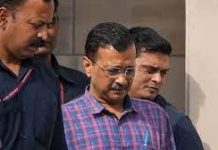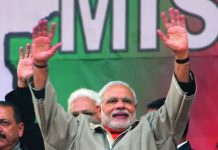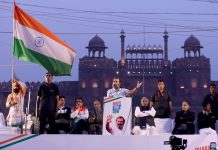Prominent mainstream leaders such as Farooq Abdullah, Omar and Mehbooba Mufti are looking towards INDIA alliance to get political concessions for the region. The future direction of valley politics depends on how the NDA-INDIA alliance rivalry shapes up, reports Riaz Wani
As the opposition alliance christens itself as the INDIA (Indian National Developmental Inclusive Alliance) and shapes up as a credible challenger to the BJP, the major mainstream parties in Jammu and Kashmir have lost no time to rally around it. Both Omar Abdullah and Mehbooba Mufti, the former chief ministers of the J&K state attended the opposition meet in Bengaluru on July 18.and batted for the wider opposition unity to take on the BJP in the 2024 general elections.
Though, J&K has little political weight in terms of bolstering the seat strength of opposition in parliament, the situation in Kashmir has perennially been a polarizing political issue in the country, more so during the parliamentary elections. And it has always been employed to great political effect by the BJP. In 2024 polls too, the altered political situation in Kashmir following the abrogation of Article 370 in August 2019 is set to be one of the major talking points of the saffron party. And to the BJP’s advantage, its hardline policy on Kashmir resonates with significant sections of people in the country.
Would the INDIA alliance be able to combat this political trump card of the ruling party? Only time will tell. It also depends on the political discourse prevailing in the country at the time. The BJP has other pan-India issues such as Ram Mandir, the Citizen Amendment Act, the Uniform Civil Code to go to people with. And despite the mounting opposition challenge, the BJP continues to be favourite to win next year’s election. That is, unless the Opposition does something that is truly spectacular and fashions an alternative political narrative that resonates with a large majority of people.
Kashmir, a side issue
As things stand, Kashmir for all its overarching importance in the past has slid into the background, something that may not give the BJP the same amount of political mileage it traditionally derived from the issue. In 2019, it was the killing of 40 security personnel in Pulwama bombing that became a major factor in retrieving the saffron party from a cornered position. Thereafter, there was no looking back for the BJP. Since then the party has become more and more entrenched in the country. Though, over the last year, it has suffered some electoral reverses in some states, including losing Bihar where it was ruling to Mahagathbandhan, the Hindutva party looks set to rule for the third time.
But as is the case with politics, it is possible that many imponderables can come into play as 2024 draws nearer. One of them is that Kashmir no longer commands the urgency that it once did. The situation in the former state has materially transformed since the withdrawal of Article 370: an uneasy calm prevails in the region, if not the peace in the true sense of term . The Modi government seems to have set a new Kashmir template which also aligns with India’s core interests in Kashmir. The dominant perception outside Kashmir is that the region has been pacified. And it does appear so to the untrained eye. While the devil may lie in the details, it won’t matter as long as the situation stays calm. Appearances may be deceptive, but it is the appearances that count.
Another change is that the reading down of the constitutional provision may have been on the BJP’s agenda, but its opposition by the other parties has become more nuanced now. The past four years have witnessed emergence of a certain political and social consensus in India around the erasure of Article 370. One can’t now find even the pretence of a contrary view on the issue as a broad spectrum of regional and national parties deem that a large majority in the country supports the move. Whether this approach outlives the end of the BJP rule remains to be seen.
One thing that this turn of events guarantees is that Kashmir won’t figure prominently as an issue in the electoral politics of the country in the run-up to 2024. That is, if there is no dramatic shift in the situation of the union territory.
Article 370 case
After four years, the Supreme Court has finally decided to hear the Article 370 petitions every day from August 2. Incidentally, the decision to do so came shortly after a team of judges visited Jammu and Kashmir. The timing of the hearings is also significant for another reason: it will be only nine months before the general elections. So, the BJP will be interested in the case being decided during this period and in its favour. This will be a shot in its arm just before the polls which it is already favourite to win.
But the party will also be aware that being the favourite doesn’t necessarily translate into a definite win. In 2003, the favourably placed Atal Bihari Vajpayee-led NDA government failed to secure a second term despite running a high-decibel Shining India campaign which appeared to resonate with people. So, ideally, the BJP may not like the case about Article 370 passing into the hands of a successor government, should that be of an opposition party or a broader alliance of anti-BJP parties. They may choose not to defend the case as aggressively as the BJP does.
Marginalized Kashmiri mainstream parties
Ever since revocation of Article 370, the BJP has ensured that Kashmiri mainstream parties are marginalized. And this has been achieved not only by curbing their political activities but also by diminishing their role through delimitation commission which gave more seats to Hindu majority Jammu. This has ensured a degree of political parity between the two regions. This despite the fact that Jammu’s population, according to the 2011 census, is around 16 lakh lesser than that of Kashmir Valley. The perpetuation of the governor’s rule because of the delay in holding Assembly polls has further removed Kashmiri mainstream parties from the political scene.
That said, even the Assembly elections, if they are held while J&K continues to be a union territory, would serve little purpose. The ultimate power will continue to vest with the Lieutenant Governor, who will also be in control of the security, which has a dominant role in the affairs of a long-troubled region.
So, the major mainstream leaders such as Dr Farooq Abdullah, Omar and Mehbooba are looking towards INDIA alliance to get political concessions for the region, as also the space for their brand of politics. The future direction of Kashmir depends on how the rivalry between the NDA and the newly launched INDIA alliance shapes up and which one of them comes to power in 2024.













